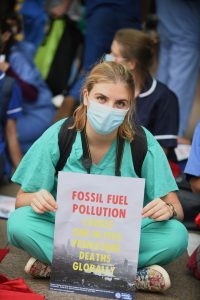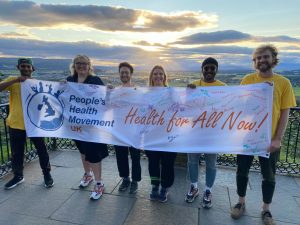Our event Health and the Climate Crisis: Voices from Manchester is tomorrow – and there’s still time to sign up. We want to put health equity at the heart of this discussion, and future work. So we were delighted to speak to Rhiannon Osborne, campaigning for health and climate justice with People’s Health Movement and Health for a Green New Deal.
Hello, who are you, where are you from and where are you currently based.
I’m Rhiannon Osborne, currently based in Cambridge in the UK where I’m studying medicine (nearly finished!). I grew up in the countryside near Bristol, but my father is from Wales and my mother is Armenian, with a long lineage of ancestors from Armenia, Palestine and Cyprus.
You organise a couple of different groups – PHM, health4gnd and Stop Cambo. What are they trying to achieve? And why do we need all three?
As someone who’s training to be a doctor, I see activism, solidarity and community work as an essential part of healing. Building a world which supports the collective flourishing of people and ecologies covers so many different fields, so it can be hard to choose one group or movement to spend my energy in, even though they are all so intricately connected.
The UK’s domestic policy when it comes to ending fossil fuels is incredibly important. The first part of climate justice is ending fossil fuel expansion, particularly in rich and historically high emitting countries like the UK. The fact that the UK can continue to expand fossil fuels whilst claiming to be a climate leader highlights the dangerous attitudes of many who believe that we can solve climate change without fundamentally changing our economies and societies, or that a billionaire will come and save us in a few years with a magical technology. Stop Cambo is working to bring energy policy in the UK in line with a liveable planet, and much of this work involves tackling the disinformation of the fossil fuel industry on this issue, which has prevented progress for defaces.
The UK’s energy policy is one part of their climate problem, but it of course goes deeper than that and includes housing, farming, transport and employment. An important part of the work at Health for a Green New Deal is highlighting just how much people are suffering in the UK as a result of the status quo, from environmental racism in air pollution to food insecurity and fuel poverty. The climate crisis is deeply linked to austerity and neoliberalism and the erosion of public institutions which can support the health of communities, and a just green new deal could help to reduce some of the horrific health inequality in the UK. Climate action, when focused on delivering justice and equity, can create a radically more beautiful and abundant life for us all.
 The People’s Health Movement is a global radical movement based on the right to health, resisting colonial capitalism and building a just, healthy world. It is led by colleagues across the world from South Africa to Brazil to India, and we work together in particular on health justice issues such as trade, climate and health systems. Through PHM, I have learnt so much, and am still learning, about everything from political theory and monitoring international negotiations to what it means to work in solidarity with siblings in the Global South. We need movements to be rooted in the lived reality of people at the frontlines of neoliberalism, imperialism and extractivism. We must connect social justice activism in the UK to those across the world resisting the violence of our exploitative economy, for without them we cannot build visions that support our collective liberation and flourishing, and may end up replicating imperialism in our own demands.
The People’s Health Movement is a global radical movement based on the right to health, resisting colonial capitalism and building a just, healthy world. It is led by colleagues across the world from South Africa to Brazil to India, and we work together in particular on health justice issues such as trade, climate and health systems. Through PHM, I have learnt so much, and am still learning, about everything from political theory and monitoring international negotiations to what it means to work in solidarity with siblings in the Global South. We need movements to be rooted in the lived reality of people at the frontlines of neoliberalism, imperialism and extractivism. We must connect social justice activism in the UK to those across the world resisting the violence of our exploitative economy, for without them we cannot build visions that support our collective liberation and flourishing, and may end up replicating imperialism in our own demands.
What have you and the organisations you have been involved in learned over the past year? Where have you failed or fallen short? (There may have been successes too but we typically reflect on those more often)
One of the things we have learnt and explored as PHM globally, in particular through the People’s Health Hearing is the importance of testimony, deep listening and radical imagination.
A lot of the time we are focussed on ‘getting stuff done’ and don’t take the time to process and absorb existing knowledge and experiences. To transform the world and tackle the climate crisis, we must understand the depth and scale of suffering at the hands of extractive industries, and learn from the stories of those who have been resisting for decades and centuries. In our (justified) urgency to find solutions, sometimes we can forget to absorb, reflect and learn together. This deep listening, in particular focused on the stories of people who have been excluded from the climate discourse, grounds us as we chart a new path forward, helps us to form spiritual connections across our movements, and allows us to truly appreciate the scale of the change required.
Part of this includes daring to imagine a radically different world built on justice and collective flourishing. We must take the time to discuss, draw, sing and share the world we are fighting for, otherwise it is easy to fall into doom and burnout. I know that I may not live to see that world, but I can pass the baton to the next generation of activists knowing that over the years we have been sowing the seeds of that world. I personally credit much of my learning about this to abolitionist organisers such as Race & Health and Cradle Community.
Another learning, in particular with the Stop Cambo campaign, is that we are learning how to win. The pause of the Cambo oil field took many of us by surprise, and was only possible due to mass mobilisation of people across the country. Often progressive movements can get comfortable with losing, so the opportunity and momentum presented by massive wins can be missed. I don’t think this is happening with Cambo – we’re working hard to expand our targets to all new oil and gas fields and demand a just transition for communities and workers – so let’s see what 2022 has in store.
Health equity and climate justice are phrases we hear more and more. But what do they mean to you? And how on earth do we bring them about?
I’m still learning so much about the deep and radical meanings of both health equity and climate justice, and everything that I know so far has come from learning from others in the movement and those on the frontlines of injustice. I don’t believe that any one person can hold in their mind and heart the expansive and beautiful worlds in which we achieve health equity and climate justice – all of us hold parts of those worlds.
When it comes to health equity, there is no place where injustice is written more starkly than on the body. The oppression and violence faced by people across the world today, from people in insecure work in the UK to those fighting oil expansion in the Amazon, is engraved onto minds, hearts, lungs, blood vessels and even cells. We cannot achieve health equity while those harms continue, and while we have an economic system set up to put profit over the health and lives of people and the planet. Climate justice is deeply connected to health equity – we cannot live flourishing healthy lives while the health of the earth, from which all of our health and life stems, is violated through extractive industries, pollution, the climate crisis and enclosure. Climate and health justice must repair harm done (i.e. reparations), but it must also abolish the worldview the has led to this harm – one built on white supremacy, human supremacy, individualism, endless economic ‘growth’ and more. Much of what I have learned about the violence of colonial capitalist worldviews has come from indigenous writers, and I still have much work to do to dismantle my own replication of these systems.
I’m not sure how we bring about health equity and climate justice. All I know is that I’m trying my hardest to contribute to movements which I think are working to build just futures, I’m constantly trying to learn and grow and hold myself accountable, and I’m also trying to enjoy my 20s and build loving relationships along the way. I believe that social movements rooted in people power are the only force strong enough to overcome the forces against us, and that to bring enough people into those movements they have to be intersectional in the deepest sense of the world. There is no climate justice without migrant, racial, disability, and gender justice, for example, and we must create shared visions as well as show solidarity and strength in our shared struggles.
Our movements must also contribute to improving the lived reality of people on the ground today. When people come together in community we can build the world we want to see in our small pockets of resistance. We can feed people in our community today whilst fighting for the transformation of food systems, and in doing so transform ourselves too.
Recommend us one thing to read – why this?
Inflamed by Rupa Marya and Raj Patel. It is a beautiful, soul-searching and rich book about the relationships between medicine, colonialism, the climate crisis, inequality and capitalism. You will gain so much knowledge from the book but it is also one of the most poetic books I have ever encountered. Their way with words and ability to weave together our intertwined realities is breathtaking.
Anything else you’d like to tell us?
Remember to rest. We are all in this for the long haul, there won’t come a point where you can suddenly stop caring, and we won’t fix all of these issues in our lifetimes. So rest, and remember that you are one of many many people who care.
